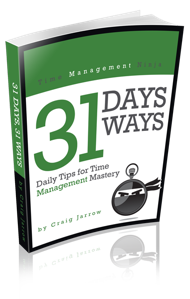
I once owned a dog that destroyed everything in our house.
It was a cute puppy, but as it grew, it chewed up all our shoes. It dug dozens of holes in the backyard. It tore open the living room sofa. And it even shred to pieces a dog training book we had purchased to help with the problem.
Task lists do the same.
As they grow, they assert themselves more and more and ruin the things we care about the most. They must be tamed!
What follows are 13 tips and tricks I’ve learned for doing exactly that.
1. Get everything you need to do in one place
How many task lists do you have? I know that’s a bit of odd question, but it’s an important one.
When I ask my clients this question, the answer I usually get is one or two. But when I dig deeper, I discover scores of places tasks are tucked away, out of sight and out of mind. That is, of course, until it has to be done, remembered at the last-minute and completed in pure panic.
A task list is any place, formal or informal, something you need to do resides.
This includes the task lists you create on your computer, and the pieces of paper strewn across your desk. It includes the pile of bills in the kitchen drawer and the reams of paper in your briefcase. It includes the files sliding around in the back seat of your car, the crumpled receipts stuffed in your wallet, and the notes you took at the marketing meeting last week that you put away (Somewhere, who knows?).
So here’s your first task taming trick: get everything you need to do in one place.
Even if it takes a morning (or a whole weekend), you’ll be amazed at the peace of mind you’ll experience when all the things you need to do are in one master list, not scattered throughout the cluttered corners of your life.
2. Make every task actionable
The second trick is this: name each task as something specific you do, not a generic idea.
When you put a task in your list, have the mental discipline at that moment to define this task as a specific action to be taken. Otherwise you’ll be creating a wish list, not a task list.
For example, if I put in my task list this statement, work on marketing, as important as marketing is to my business, the statement is not a task because it’s unspecific.
In other words, the phrase, work on marketing, is not actionable. But if I enter into my master task list, write weekly blog post, I now have something very specific I can actually do.
3. Make every task singular
While you’re naming your tasks as something you do, make sure that it’s one thing and one thing only.
If I put the words, produce podcast, in my task list, I would be violating this rule. To produce a podcast, I need to write a script, record the audio, edit the audio, optimize for keywords, and upload it to my web site. That’s not one task, it’s five; and all of those tasks must be written down so they get done without fail.
Again, this takes mental discipline at the moment you’re creating the task, but the pay-off is a task list that tells you exactly what needs to be completed at any given time without guessing.
4. Automate task series
A task series is something that requires a sequence of steps to complete.
Many of the things we have to do are not isolated actions, but actions dependent on previously completed activities. When this is the case, create a task series and save that series for future use, like the podcasting example above.
Most task management software allows for the creation of sequential lists. If you’re a paper person, write down your task series and pull out the list whenever you need it.
The point is this: Once a series of steps have been created, don’t think about them again. Just follow the list. Every time I go on a business trip, all I have to do is pull out my packing list and in 10 minutes I’m ready to go. Beats going on a trip without underwear (which I have done).
5. Assign due dates to your tasks
Another mental discipline when creating a new task is to give that task a due date. Even if it’s a provisional due date, the assignment increases a task’s probability of getting done. Tasks not assigned a due date get lost in a generic list that never see the light of day.
If I don’t know exactly what day a task needs to be completed, I’ll assign it to Monday of the week it’s due or to the first Monday of the month it’s due. In this way Monday acts as a staging area that I review at the beginning of the week and can move to other days of week.
6. Utilize a Someday task list
If no due date truly exists for an action you want to complete, but you still want to do this activity, put it in a Someday list.
Tasks in my Someday list consist of classes I want to take, trips I want to go on, and things I want to buy. Instead of having them floating around in my head, I capture these things and review them on a weekly basis.
Some of these tasks ultimately get deleted, and others get moved to a specific day and time. But nothing gets forgotten.
7. Prune your task list every week
While you’re reviewing your Someday task list each week, review your master task list as well and keep it pruned.
A master task list tends to attracts things to it like flies to manure. Just because you’ve captured an action item and placed that item in a list, it does not mean you must take action on it.
All tasks are not created equal. Sift through your master task list every week using this criteria:
A – Top Priority, Time Sensitive
B – Top Priority, Not Time Sensitive
C – Not Top Priority (Time Sensitivity irrelevant)
Do the A’s and B’s on your list and D, delegate, or E, eliminate, everything else.
8. Track delegated tasks
Speaking of delegation, delegated tasks provide an interesting challenge to taming one’s task list.
By definition, a delegated task is something someone else needs to do, not you. But as many business leaders know all too well, delegated is not done. This is especially true if you delegate tasks and never follow-up on them.
So here’s your solution. Create a sub-list in your master task list with the heading, Delegated Tasks. In that sub-list record the things you’ve given others to do with the name of the person to whom it was delegated and the due date for completion.
You could even use an alarm to remind you to check in with that person a few days before its deadline, then check off the task when it’s completed. This simple follow-up system will ensure that delegated task actually get done and create a culture of accountability within your sphere of influence.
9. Quickly turn email into tasks
Don’t let your email inbox become a secondary task list. That’s not what email is for.
If an email has an action associated with it, immediately turn that item into a task using the naming protocols above and assigning a due date to it, deleting or moving the email from your inbox.
Most task management software allows you to do this quickly and easily with click and drag capabilities (even saving attachments in the Notes section of the task). Plus, it’s tremendously liberating to get those commitments out of your inbox and into a bulletproof system.
10. Limit the amount of tasks you do in a day
Here’s a tip I learned from Alan Weiss that at first I rejected out of hand.
I’m part of Alan’s Million Dollar Consultant community, and he’s advised us to never do more than eight things in a day. I bet you’re rejecting this advice right now as well. But before you do, consider this: there are few thought leaders anywhere who can match Alan’s extraordinary output of intellectual property.
So here’s his explanation. By giving yourself only eight things to do in a day, you force yourself to do only the most important things and eliminate trivialities.
Not a bad strategy.
Most of us attempt to do way too much in a day and have a hard time focusing on that which matters most. Here’s a simple way to solve that problem. Alan admits he picked the number eight at random, but the days I’ve used this technique have been incredibly productive for me.
11. Turn off your email, text alerts, and status updates
A repeated task that all of us get trapped into doing throughout the day is checking email, texts, and status updates.
Technology has become our master and not our servant in this regard, and it’s a cruel master. Recent research indicates that we waste at least a third of our day either being interrupted by digital communication or getting back to what we were doing after being interrupted by digital communication. No wonder so many business leaders end up doing much of their work in the evening or on the weekend.
Here’s how to tame this task tyrant. Turn it all off and set fixed times in your day where you’ll answer all inbound digital communication. I do this at the beginning of the day, mid-morning, and mid-afternoon. That’s it.
When you do this, two things will happen. First, the quality of your communication will actually improve because you’ll be giving it your undivided attention. And second, personal productivity will soar because you’re not being interrupted every few minutes with a new email, text, or tweet.
The reaction I get from my clients when I encourage them to do this is rolled eyes and snide smirks. But those who have persevered in this have discovered without exception a freedom in their days that’s nothing short of amazing.
12. Keep your master task list with you at all times
When everything you need to do is all in one place in your master task list, your mind can rest at ease because it knows that the commitments you’ve made will be kept. The more you do this, the more at rest you’ll be because you’ll grow to trust the system completely.
All you have to do now is remember one thing. That’s it, one thing: your master task list.
If you’re a paper person, keep it with you wherever you go. If you’re a computer person, sync your master list with all your devices and back it up religiously. When something comes up that you need to do, capture it right then and there and keep going throughout your day worry-free.
13. Unplug one day a week
Most ancient cultures practice a rhythm of rest once every seven days. Being available 24 hours a day, seven days a week is a very recent development, and it’s not a healthy one.
Few would deny that murder, lying, and stealing is wrong, but the same Ten Commandments that prohibit these things tells us to remember the sabbath day, laying out a weekly rhythm of six days of work and one day of rest.
So my last piece of advice in taming your task lists is this: unplug one day a week.
Pick a 24 hour period of time where you don’t look at your things to do list, your smart phone, your laptop, or any other electronic device. In that 24 hour period of time simply rest, relax with family and friends, and renew your body, soul, and spirit. Your life will never be the same, and you’ll return to work energized and refreshed for the week.
Here’s the bottom line:
“Everything you do requires your time,” Peter Drucker wrote decades ago in The Effective Executive. “Unless you manage your time, you will not be able to manage anything else. The management of your time, therefore, is the foundation for your success.”
In other words, tame your task list!
Pick one of these tricks to work on each week for the next 13 weeks. Master it and move on to the next one. In just 90 days you’ll be amazed at the dramatic difference it will make in your work and your life.
Question: What is your best tip for taming your todo list?
 I am the author of Time Management Ninja and help individuals and companies reclaim their time to be more productive. As well, I am the author of the book
I am the author of Time Management Ninja and help individuals and companies reclaim their time to be more productive. As well, I am the author of the book 

GREAT tips. My favorite time management deal is Mind Organization for Moms. It is a way to apply work organization to home management! I could feel similarities here and could apply. I keep hearing & seeing SABBATH and keep ignoring that. I would like to do a tech free day, would it be better to do it on a weekday when I am home with my little girls, or on a weekend with the family….Hmmm.
Pretty cool tips. Actually I was landed on a page exactly what I was searching for. Basically I purchased a task management tool and to properly streamline the whole project or task I need to have some good tips to get all thing done up in time and see to my luck that I came here. Thanks for the tips.
I am sure that if I will work with my task management tools with these wonderful sort of tips definitely I am gonna win this world.
These tips may be usefull only for very small companies, just because nowadays everything is computerized. If you are a business runner and you sometimes want to forget everything and just to relax, make the same as I do. I suggest you to start using this programme- crm 🙂 It is perfect for small or medium business! No I can’t imagine my bussines without this thing, try to do the same and you will not regret.
I like this blog post very much and the view about project management was awesome and I want to address all the reader to share this post as much as you can and if any needed Project management software like asana, Monday, Zoho projects… Go on: http://www.softwaresuggest.com/gcc/project-management-software/
Good good topic